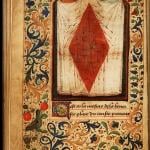![]() St. Nicholas has a special place in the hearts and minds of the faithful of the Byzantine Catholic Metropolia of Pittsburgh, because he is its patronal saint. His feast is celebrated throughout the Metropolia with all kinds of traditional festivies. And yet, as we come to his feast day, perhaps we should also reflect upon his life and deeds, and discover the example he provides to us as to what it means to be a Christian.
St. Nicholas has a special place in the hearts and minds of the faithful of the Byzantine Catholic Metropolia of Pittsburgh, because he is its patronal saint. His feast is celebrated throughout the Metropolia with all kinds of traditional festivies. And yet, as we come to his feast day, perhaps we should also reflect upon his life and deeds, and discover the example he provides to us as to what it means to be a Christian.
“The truth of things revealed thee to thy flock as a rule of faith, a model of meekness, and a teacher of temperance. Therefore thou hast won the heights by humility, riches by poverty. Holy Father Nicholas, intercede with Christ our God that our souls may be saved” (Troparian of St Nicholas).
Born around 270 CE, near Myra, St Nicholas was raised in a well-to-do Christian family: his uncle was a bishop who made sure Nicholas was given a full Christian upbringing and education. He had a charitable disposition, one which has become famous throughout the centuries, such as when he gave, anonymously, money to a pauper so his daughters could have dowries and would not have to become prostitutes. He was concerned about the wellbeing of others, even if it came at the expense of his own welfare; his innate goodness provided him many opportunities in which this would happen, leading to many instances where miracles occurred because of his actions. Because he was open to the promptings of God, he was able to be used as a vessel by God for the blessings others – and he did so without becoming prideful about it. Since he was a great steward of God’s blessings during his life, it is no wonder that he continues to share the grace of God to others in his beatitude.
Perhaps one of the most famous miracles in his biography comes from when he was heading towards Jerusalem. He was with a group of pilgrims traveling to the Holy Land by sea. While on their journey, he saw that their ship was being was being pursued by a demon, and he told the people with him that they would be attacked by the demon before they reached land. Such was indeed the case, as their ship was engulfed by a great storm; Nicholas, in his prayers, was ultimately able to gain victory over the demon and to calm the waters but not before one of the crew of the ship had suffered greatly, having fallen off the ship’s mast, leading him to being mortally wounded. Nicholas prayed for the sailor’s health to be restored — and his prayer was answered. This story helped lead to a cult of St Nicholas among sailors, making him one of the guardians they go to when in a time of need.
“You revealed yourself, O saint, in Myra as a priest, for you fulfilled the Gospel of Christ by giving up your soul for your people, and saving the innocent from death. Therefore you are blessed as one become wise in the grace of God” (Kontakion of St Nicholas).
Nicholas lived his faith to its fullest, becoming one of its leaders, never backing away from his beliefs, even in a time of great persecution. Since he was a bishop, he was a person of interest to the Roman authorities, and ultimately, he became one of many who had been imprisoned by Diocletian. While he was in prison, he worked to lift up the spirits of his fellow Christians, helping them to persevere in the faith, and not give up hope. It was only when the persecutions were stopped by St Constantine that Nicholas was let out, and return as a champion of Christ to his people.
But he came back to find a Church in disarray. Now that the persecutions were over, Christians had the time, the freedom, to contemplate their faith. Questions which had been left aside had become prominent, and, because different people answered them in contradictory fashions, factions had developed in the Church. Previously, the Church tried to get general answers to the questions. Now that there was an influx of new converts, the Church could no longer ignore those questions, but had to find a way to answer them, to make sure the fullness of the faith was preserved and proper catechesis was being given to these converts. But, as Nicholas was to find out, theological confusion led to a divided Church, and people some of its leaders were involved in making ecclesial schisms. Fundamental questions, such as who the Church proclaimed Jesus Christ to be, needed clearer answers. While tradition had long proclaimed the divinity of Christ, what that meant had not been well understood. When St Alexander of Alexandria proclaimed the divinity of Christ, saying that he was begotten but not made, and that there was no time in which he did not exist, Arius, one of his presbyters began to dispute this – Arius’ understanding of Jesus was that his divinity was derivative, that he was the “created God”, formed at the foundation of the world, while the Father was greater, higher, and different from the Son, and in a sense, the only true God. Christians began to fight and persecute one another over this question; what pagans had once done to them, they now did to one another. Charity and good will, which kept them united when contending against the authorities of Rome, vanished, and human concupiscence took over. The Church had yet to learn how to deal with these struggles, and so it should not be surprising that mistakes were made, even by some of its brightest and best figures.
Tradition claims St Nicholas, as one of the bishops of the Church, was involved in this conflict, and was even at the Council of Nicea, where Arius, the originator of the conflict (but not its only theologian) was asked to make his case known and to defend it in front of the leadership of the Church. Nicholas was predisposed against Arius, and did not think he should be given such freedom to speak- and told him so, to his face, before punching Arius. The veracity of this story is not known, and indeed, the lists of bishops we have from the council do not show Nicholas as being among them – however, since the tradition states he was himself thrown out of the council for what he did to Arius, it is quite possible this is the reason why his name is not in the list of any of its signatories. Clearly if there is any truth to this story, Nicholas, who theologically was correct in denying Arius, does not have to be seen as blameless in what he did – but, being out of order, and sinning, as would have been the case, does not undermine his general cool, his great charity, and his otherwise spotless witness for Christ. Sin in anger is still sin, but sin can be, and is, forgiven by grace – to embrace charity, to live it as the central core of one’s life, that is commendable – and Nicholas’ greatness here is what made up for a multitude of sins, and allowed him to become one of the Church’s most famous saints. It is also what makes him an exemplar for us; we do not have to be wealthy to follow his example, we can all live our life in charity, no matter what situation we find ourselves in. We can all embrace Christ, live for Christ, turn our life as a living witness for Christ, and indeed – that is what we are called to do. To die to the self is to let Christ live in us – and with that, to find true life, for it is only by losing our worldly existence for the sake of the kingdom, that we gain it back, not in its imperfect, fallen mode which we originally had it in, but its original, pristine glory. And it is this which we now see present when we encounter the saints – and a joy to celebrate, because of what that very presence can and does do for our lives.
O who loves Nicholas the saintly,
O who serves Nicholas the saintly,
Him will Nicholas receive,
And give help in time of need:
Holy Father Nicholas!
He who dwells in God’s holy mansions,
Is our help on the land and oceans,
He will guard us from all ills,
Keep us pure and free from sins
Holy Father Nicholas!
Holy Saint, hearken to our prayer,
Let not life drive us to despair,
All our efforts shall not wane,
Singing praises to your name:
Holy Father Nicholas!












